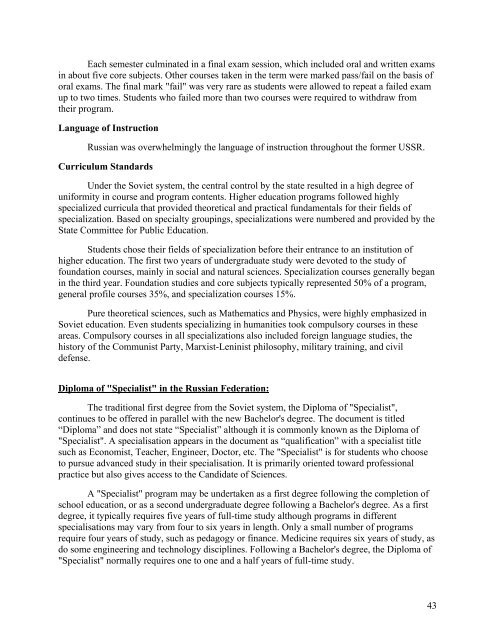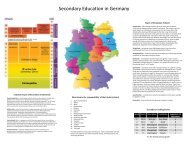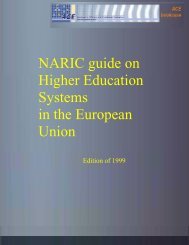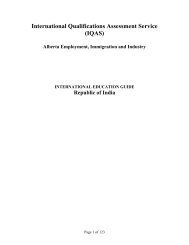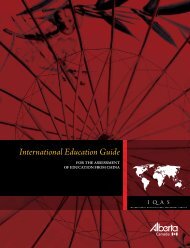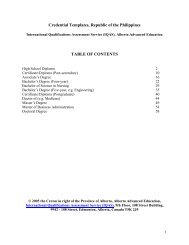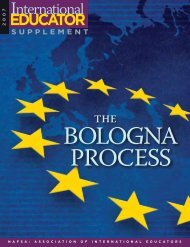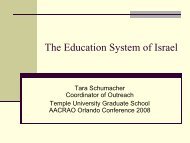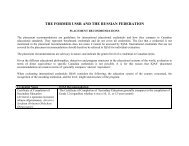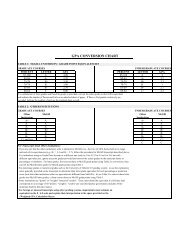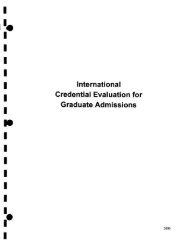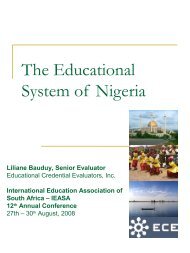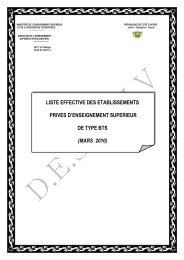Credential Templates, The Former USSR and the Russian Federation
Credential Templates, The Former USSR and the Russian Federation
Credential Templates, The Former USSR and the Russian Federation
Create successful ePaper yourself
Turn your PDF publications into a flip-book with our unique Google optimized e-Paper software.
Each semester culminated in a final exam session, which included oral <strong>and</strong> written exams<br />
in about five core subjects. O<strong>the</strong>r courses taken in <strong>the</strong> term were marked pass/fail on <strong>the</strong> basis of<br />
oral exams. <strong>The</strong> final mark "fail" was very rare as students were allowed to repeat a failed exam<br />
up to two times. Students who failed more than two courses were required to withdraw from<br />
<strong>the</strong>ir program.<br />
Language of Instruction<br />
<strong>Russian</strong> was overwhelmingly <strong>the</strong> language of instruction throughout <strong>the</strong> former <strong>USSR</strong>.<br />
Curriculum St<strong>and</strong>ards<br />
Under <strong>the</strong> Soviet system, <strong>the</strong> central control by <strong>the</strong> state resulted in a high degree of<br />
uniformity in course <strong>and</strong> program contents. Higher education programs followed highly<br />
specialized curricula that provided <strong>the</strong>oretical <strong>and</strong> practical fundamentals for <strong>the</strong>ir fields of<br />
specialization. Based on specialty groupings, specializations were numbered <strong>and</strong> provided by <strong>the</strong><br />
State Committee for Public Education.<br />
Students chose <strong>the</strong>ir fields of specialization before <strong>the</strong>ir entrance to an institution of<br />
higher education. <strong>The</strong> first two years of undergraduate study were devoted to <strong>the</strong> study of<br />
foundation courses, mainly in social <strong>and</strong> natural sciences. Specialization courses generally began<br />
in <strong>the</strong> third year. Foundation studies <strong>and</strong> core subjects typically represented 50% of a program,<br />
general profile courses 35%, <strong>and</strong> specialization courses 15%.<br />
Pure <strong>the</strong>oretical sciences, such as Ma<strong>the</strong>matics <strong>and</strong> Physics, were highly emphasized in<br />
Soviet education. Even students specializing in humanities took compulsory courses in <strong>the</strong>se<br />
areas. Compulsory courses in all specializations also included foreign language studies, <strong>the</strong><br />
history of <strong>the</strong> Communist Party, Marxist-Leninist philosophy, military training, <strong>and</strong> civil<br />
defense.<br />
Diploma of "Specialist" in <strong>the</strong> <strong>Russian</strong> <strong>Federation</strong>:<br />
<strong>The</strong> traditional first degree from <strong>the</strong> Soviet system, <strong>the</strong> Diploma of "Specialist",<br />
continues to be offered in parallel with <strong>the</strong> new Bachelor's degree. <strong>The</strong> document is titled<br />
“Diploma” <strong>and</strong> does not state “Specialist” although it is commonly known as <strong>the</strong> Diploma of<br />
"Specialist". A specialisation appears in <strong>the</strong> document as “qualification” with a specialist title<br />
such as Economist, Teacher, Engineer, Doctor, etc. <strong>The</strong> "Specialist" is for students who choose<br />
to pursue advanced study in <strong>the</strong>ir specialisation. It is primarily oriented toward professional<br />
practice but also gives access to <strong>the</strong> C<strong>and</strong>idate of Sciences.<br />
A "Specialist" program may be undertaken as a first degree following <strong>the</strong> completion of<br />
school education, or as a second undergraduate degree following a Bachelor's degree. As a first<br />
degree, it typically requires five years of full-time study although programs in different<br />
specialisations may vary from four to six years in length. Only a small number of programs<br />
require four years of study, such as pedagogy or finance. Medicine requires six years of study, as<br />
do some engineering <strong>and</strong> technology disciplines. Following a Bachelor's degree, <strong>the</strong> Diploma of<br />
"Specialist" normally requires one to one <strong>and</strong> a half years of full-time study.<br />
43


